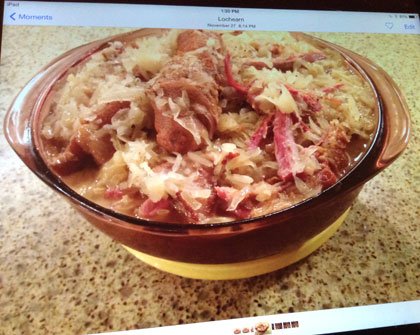BALTIMORE — Why is sauerkraut a traditional holiday side dish in Baltimore? Where did it originate?
Sauerkraut, which means “sour cabbage” in German, is pickled cabbage. Fermented foods have a long history in many cultures, with sauerkraut being one of the most well known instances of traditional fermented cabbage side dish. It is believed that it was introduced to Europe in its present form more than 1,000 years ago after an invasion of China. It took root mostly in Eastern European countries and German cuisines. Eastern Europeans in particular eat a lot of sauerkraut.
Sauerkraut was introduced in the United States, particularly in the northeastern area. In Pennsylvania, it is eaten with pork on New Year’s Day. This tradition was started by the Pennsylvania Dutch, is thought to bring good luck for the upcoming year.
Serving sauerkraut in Baltimore at Thanksgiving is an old tradition rooted in the homes of the city’s German immigrants. In 1863, when President Abraham Lincoln declared Thanksgiving a national holiday, about a quarter of Baltimore’s population was German. Sauerkraut was a staple on the table and so it became a common part of Thanksgiving meals across the city whether or not your family was German.
Baltimoreans prepare sauerkraut with pigtails, smoked pigtails, or neck bones. Sauerkraut may be purchased in the refrigerated section of the supermarket in bags or on the shelves in jars or cans. Some markets will have crocks of sauerkraut.
An excellent cook, Phyllis Watkins purchases sauerkraut in bags and prepares it with smoked pigtails for Thanksgiving and Christmas.
Phyllis’ Sauerkraut with Smoked Pigtails
Phyllis Watkins prepares sauerkraut for Christmas and Thanksgiving.
Smoked Pigtails
2 lbs. sauerkraut
1 peeled apple
Salt and pepper
Dark Brown Sugar
Cook pigtails until tender almost coming off the bone. Add sauerkraut, and then add a peeled cored apple. Add salt and pepper to taste; finally add a dash of dark brown sugar. Simmer until ready to serve.

